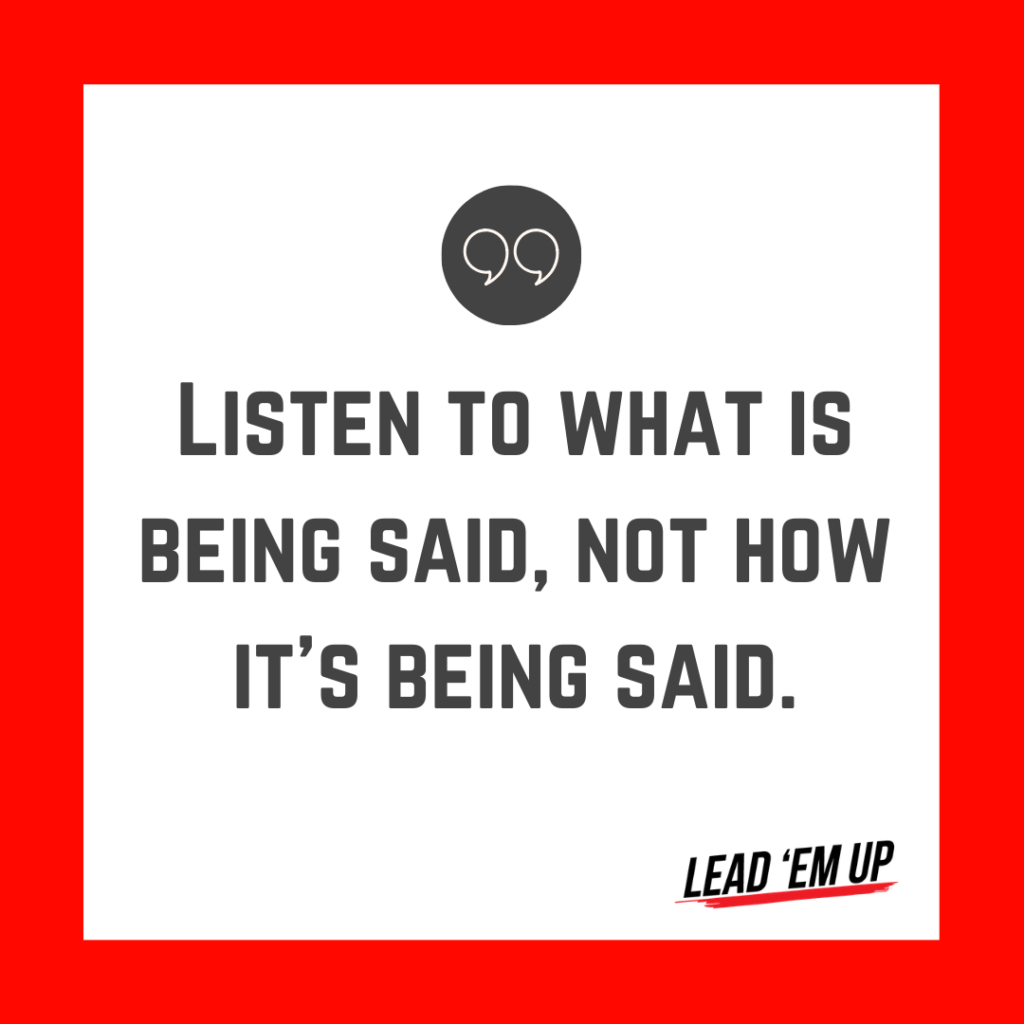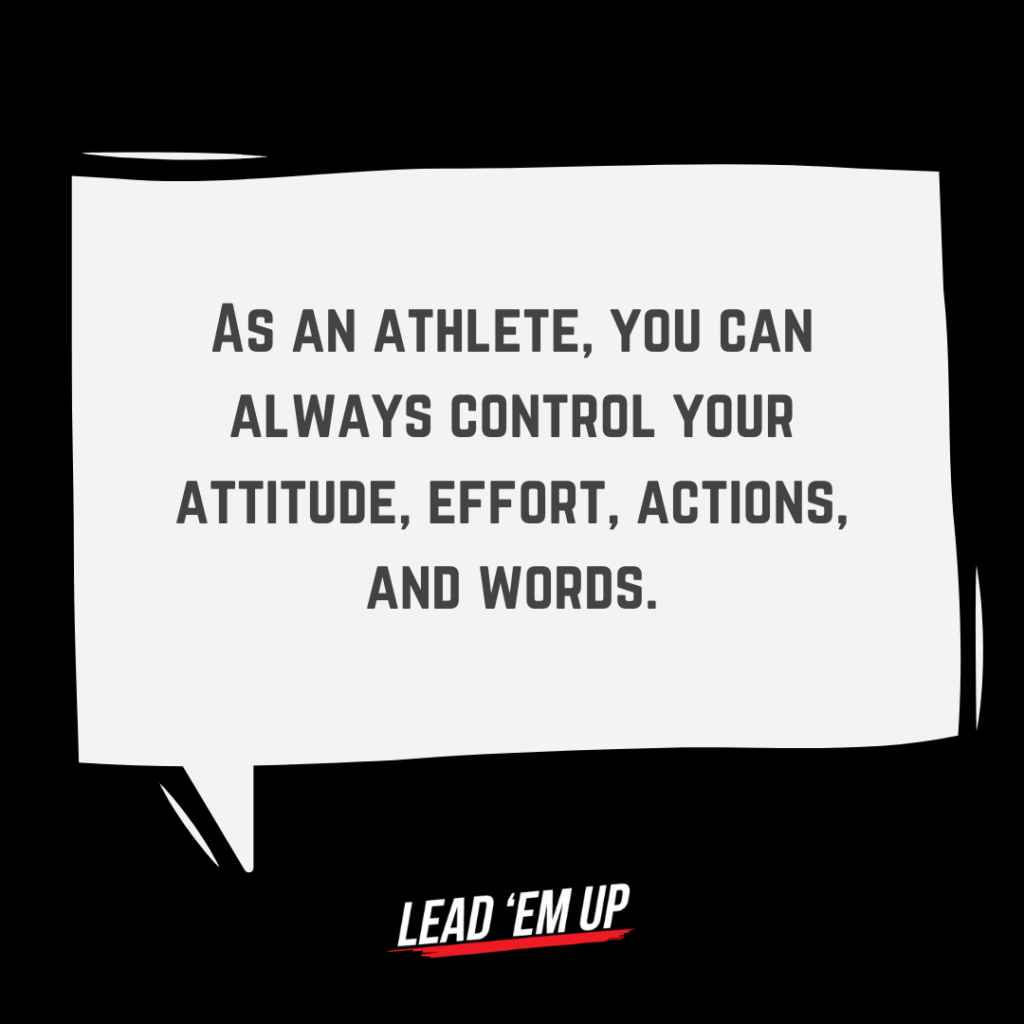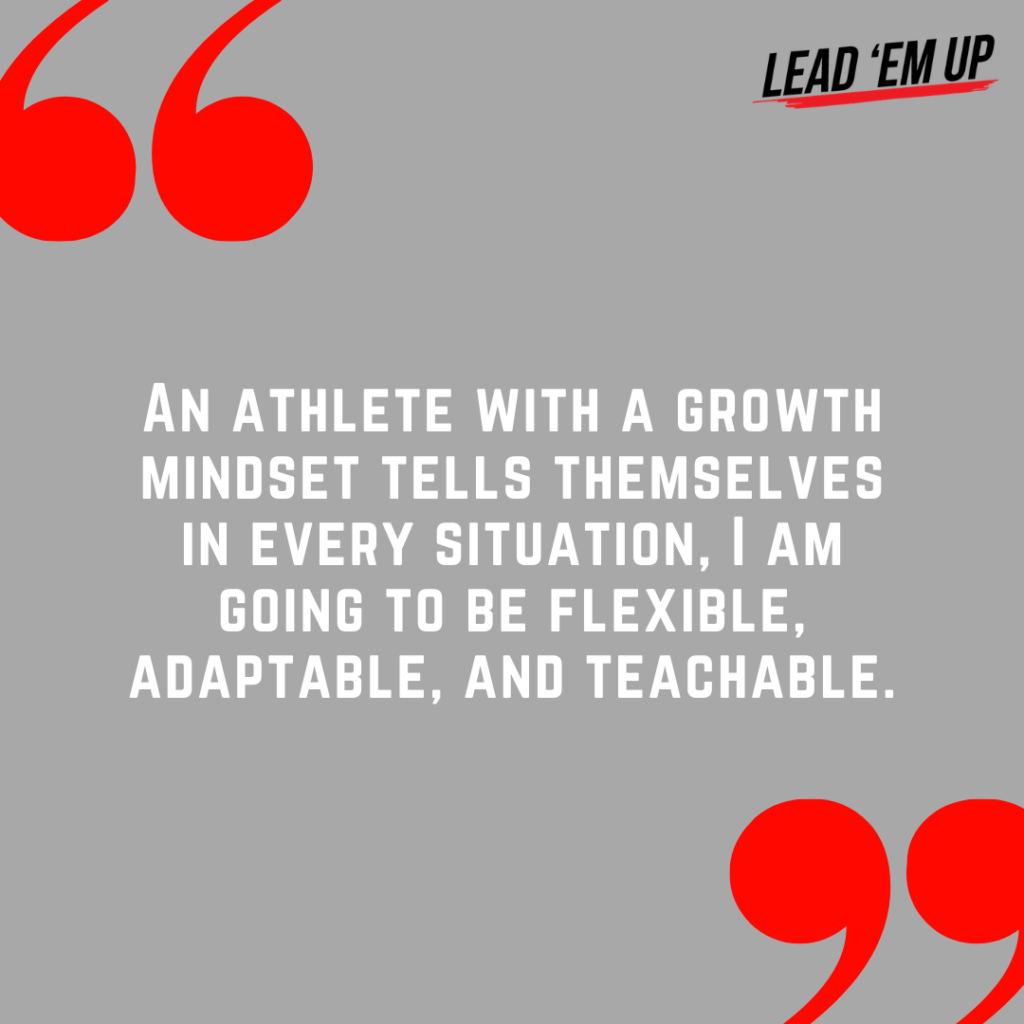
All athletes to some degree experience fear or anxiety while playing the sport they love. Fear of failing, fear of missing a shot or making a mistake, and the fear of succeeding. Yes, even succeeding because we may think to ourselves, “Can I handle sustaining that success for any length of time?” And of course, there is the fear that stems from our coaches who at times may use fear-based coaching methods. Now, if this sounds familiar, athletes, then listen up and keep reading!
The Proper Perspective
I am by no means saying that fear-based coaching tactics that coaches use are neither entirely good nor bad. I have known many coaches at all levels to succeed with this kind of coaching style. The premise, however, is not to dissect how successful or not a coach is with fear-based tactics, but rather, to provide a perspective for the athlete to better serve you on and off the playing field.
As a player, I too struggled with fear-based coaching in high school and college. I have worked with many athletes who have shared with me their story playing for a coach who instills fear during practices at the youth through professional level.
For example, a coach might say in practice, “If you do not get this right, you will be on the line doing sprints for the remainder of practice!” Sound familiar? While some coaches have found extrinsic motivation may work for them, there is still the remainder of teams out there where this kind of fear-based coaching does not work.
Therefore, this often results in players playing despite their coach, rather than for the coach. A player’s common response may be, “making me feel bad about my mistake or performance does not motivate me or inspire me to try to perform better on or off the court.”
What to focus on
Believe me athletes, most coaches who implement fear-based coaching tactics want the best from you and believe they are doing what they can to try to stimulate an adequate response from you to prepare you for games and life on and off the playing field. Yet, we find it is the exact opposite that is true and leads athletes to become unmotivated and discouraged. It is important, however, to understand this: the focus here is not how to change your coach but to equip you with tools in dealing with one who uses fear systems and strategies.
When facing a coach who uses fear-based coaching tactics here are five crucial questions to ask yourself. These may also help to be proactive for your success on and off the playing field:
1. What is My Approach?
 We’ve all heard the question, “Do you see the glass half empty or half full?” While practices can feel grueling and long at times, do you have an optimistic approach heading into practice or are you already dragging your feet, complaining just before stepping onto your platform? Do you have an approach that says “let’s make this the best practice we can” or despite coaches’ methods, do you walk into practice striving to be a leader who motivates others? Do you remain hopeful and confident about what lies ahead for you and your team?
We’ve all heard the question, “Do you see the glass half empty or half full?” While practices can feel grueling and long at times, do you have an optimistic approach heading into practice or are you already dragging your feet, complaining just before stepping onto your platform? Do you have an approach that says “let’s make this the best practice we can” or despite coaches’ methods, do you walk into practice striving to be a leader who motivates others? Do you remain hopeful and confident about what lies ahead for you and your team?
I never said this would be easy, if it was, everyone would be doing it. Regardless of the fear your coach tries to instill in you, it is important to take a step back and realize this is an opportunity for you. An opportunity to work out the muscle or mental toughness. You are in a unique position to develop grittiness and resilience, to remain open-minded, to tell yourself coaches methods may help you one day when you have a boss who uses fear towards his/her employees.
Remember, you always have a choice when looking at your current situation, so what’s the glass really telling you and what’s your approach going to look like?
2. How am I Receiving the Information?
Many times when my coach would humiliate me in front of my teammates for what I thought was a tedious mistake, I never stopped to ask myself, “how am I receiving his message?” When I finally did, of course, my first thought was exactly how I heard it, his message was ruthless, too loud, and uncomfortable, and I did not care for it. However, I learned when my team captain told me, “Listen to what he is saying, not how he is saying it.”
 What she meant was that, sure, you will disagree at times, but when you listen to what he is saying and not how, it will allow you to extinguish the fear that came with a loud voice. This tactic my teammate shared with me allowed me to also avoid the previous embarrassment I felt when he would yell in front of the entire team.
What she meant was that, sure, you will disagree at times, but when you listen to what he is saying and not how, it will allow you to extinguish the fear that came with a loud voice. This tactic my teammate shared with me allowed me to also avoid the previous embarrassment I felt when he would yell in front of the entire team.
It also allowed me to work confidently and be forward-thinking and not be anxious about making another mistake. Again, you may not always agree with what your coach says, but listening to the words rather than the delivery will allow you to interpret the information without fear of failure and foster a better rep.
3. What am I Compartmentalizing?
We are ambitious beings and have from one time or another been guilty of thinking we have more control over things than we tend to realize. Much of what we perceive to be in our control is often the thing that keeps us up at night and on the hamster wheel.
I see it time and time again, players believe they will change their coach and often end up more disappointed and upset when they realize trying to change someone is exhausting and inconsequential. As an athlete, you can always control your attitude, effort, actions, and words. So, athletes, do not limit your potential and growth by focusing on the wrong things or things outside your control. It will only lead you to feel burnt out and unsuccessful.
It’s important to understand we may not always be able to control what’s happening but we can control how we respond to what has happened. One way to control our circumstances is to compartmentalize things happening in your life and sport. This will empower you to focus on being present.
 For example, before going into practice, check-in with yourself to see if you’ve put away any thoughts about school or tests, outside relationships, and any other distractions. This will allow you to focus all of your attention on being present and engaged during practice. You cannot control or deal with any outside circumstances while in a practice or while in a game; so you might as well make the most of your time.
For example, before going into practice, check-in with yourself to see if you’ve put away any thoughts about school or tests, outside relationships, and any other distractions. This will allow you to focus all of your attention on being present and engaged during practice. You cannot control or deal with any outside circumstances while in a practice or while in a game; so you might as well make the most of your time.
Lastly, make a list of what is in your control and what isn’t. This may take you less than five minutes to complete. Draw a line down the center of your paper and label the paper at the top your sport. On the left side of your paper write “my non-controllable” and on the right said title it “what I can control.” After you complete your list, review it, and compare your list. After all, when we are talking about being right, it is important we look to the right side of our paper. We can then move forward by only focusing on what you have the power to control.
4. What is My Mindset?
As I mentioned earlier, we always have a choice when dealing with fear-based coaching. It becomes important to ask, “Do I have a growth mindset or a fixed mindset?”
Let me explain, a growth mindset is similar to our optimistic approach, whereas a fixed mindset might think, “there’s no way I’ll ever get better with a coach who always yells,” or “coach is never going to change, so why should I?”
Then there is my favorite, “It doesn’t matter what I do, coach doesn’t like me anyway.” (side-note: coach would not have you on the team if he/she did not like you, because all coaches can make cuts). A growth mindset, however, is one that seeks the gold, finding the one per-centers in practice that will make you better, one that sees a challenge and gets excited. An athlete with a growth mindset tells themselves in every situation, I am going to be flexible, adaptable, and teachable.
Let me give you another illustration.
Have you ever had a practice where it seemed like your coach was picking on you; or stopped practice to yell at you; or seemed like he/she had a bad day and was taking it out on you?
First, remember you can only control what you can control but second, change the mindset. Every time coach stops practice directed at you, tell yourself I’m getting coached. You may not like the delivery but while everyone else is standing around, your coach has something he/she thinks is important for you, and out of everyone on the team you are getting the most coaching at that moment.
Sure, you might say, “I wish coach would have a different approach,” but that’s not in your control- your mindset is. When you start to choose a growth mindset, you begin to see all those “embarrassing” moments when coach would only yell at you, as teachable moments that will better you. Therefore, by the end of practice, you will feel as though you had the most coaching out of everyone. Allow times like these to drive you, motivate you, and strengthen you.
5. What am I Communicating?
Many players I’ve talked to who feel “stuck” or as though they are not sure what to do with their current situation with their coach, I always ask, “well have you tried talking to your coach?” I am always amazed by how many players tell me, there is no point or that the coach will not see it from their perspective so it’s no use. Sounds similar to a fixed mindset, doesn’t it?
You may go in to talk to your coach and they still do not change their perspective, but why leave it up for chance? What if talking to your coach developed more trust, a better relationship, a better understanding of your player-to-coach dynamic, and more respect for one another?
One of my favorite quotes says “Communication is still the world’s number one problem-solving tool.” Many people choose not to communicate because they may be dealing with tough conversations, but those same tough conversations are what allow for more heartfelt moments that are invaluable. Teaching and embodying effective communication skills with your athletes before these tough moments happen will make these moments better communicated and received.
Please do not misunderstand what I am saying, as many players more times than not go in to talk to their coach about playing time expecting their coach to agree. In that conversation, however, your coach might hand you the stat sheet and discuss with you why you are not playing as much as you thought you should.
While your coach may not change how much he/she plays you after that conversation, and although they control the subbing, you again, control your attitude and work ethic. Therefore, train smarter and harder, and embrace the process of the journey to grow in your development. Another advantage to having that conversation may lead to a better understanding of what you do need to do to get that playing time. Simply have the conversation and talk it out, keeping in mind you cannot be afraid to hear the answer by asking the questions.
 This leads me to a hard truth many players do not want to hear…many players make the mistake of trying to survive their current situation, rather than thriving somewhere else.
This leads me to a hard truth many players do not want to hear…many players make the mistake of trying to survive their current situation, rather than thriving somewhere else.
Here is what I mean: Maybe by talking things out with your coach, or your parents and mentors, you find that it is best to transfer schools. Maybe as you have gotten older you realized talking it out looks like hanging up the kicks?
Let me be clear, there is nothing wrong with that. Many players tough it out because of outside pressures from peers, family, coaches, etc. Those same players, however, end up regretting wasting time, feel burnt out, and feel as though they let down the ones who are closest with. Talking it out may very well allow you to self-reflect and ask, “Am I playing this sport because it is what I love, or am I doing it for someone else?”
Believe me, there will be times in practice or after games when it does not feel like you love the sport or the hardships that come with the battle. Yet every athlete knows that is a part of the journey where love endures.
Remember, the difficulty does not always mean it is time to quit. Playing the game you love comes with getting your knees banged up and maneuvering through trials that come with wins and losses on and off the field. There might be a time when you truly know if this is where it ends for you and you make your peace to go explore, try new things, and seek other talents you have or enjoy doing. When in doubt, have the conversation.
Focus less on the coach and more on your development as a leader.
In conclusion, coaches at all levels have different styles, methods, and principles and the truth is you may not always play for a coach you agree with. You can, however, learn to play for that coach by focusing on the five crucial questions we uncovered. Fear can be tricky as many athletes experience fear and anxiety to some degree while playing competitive sports. When you understand your coaches’ fear-based coaching tactics, it becomes easier to focus less on the coach and more on your development as a leader.
Fear is a facade, meant to steal you from positive and logical thinking. As Dr. Kal Menninger, who practiced medicine with his father studying psychiatry and mental health stated, “fears are education into us, and can if we wish, be educated out.” Here is an illustration when thinking of what fear really means.
Fear is a…
- F – Fire that
- E – Extinguishes positive
- A – Actions for
- R – Reward
Athletes, do not allow fear-based coaching tactics to limit you and your ability to grow as a leader and as an athlete. Fear is folly and when you can see that fear is just a fire that extinguishes positive actions for a reward, you can start to be proactive. One can then choose actions and thoughts that assist you and your development and not hinder your performance.
Lastly, be the example and leader others want to follow by being optimistic, receiving the information, controlling what you can, demonstrating a growth mindset, and having brave conversations. If you can do those five things, I think the future with your coach and teammates will look, sound, and feel more advantageous.
Keep shining!
Have fun and #LeadEmUp




